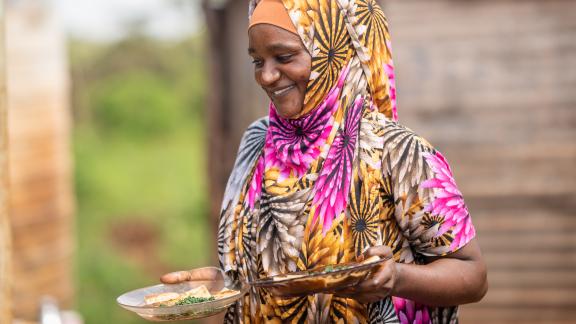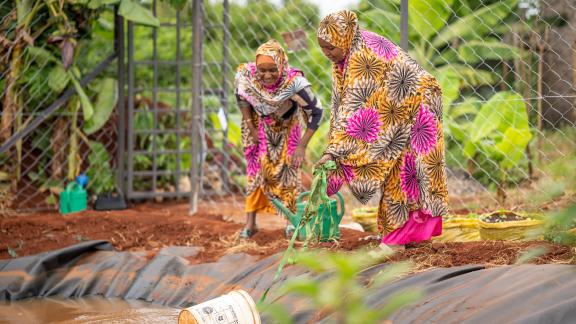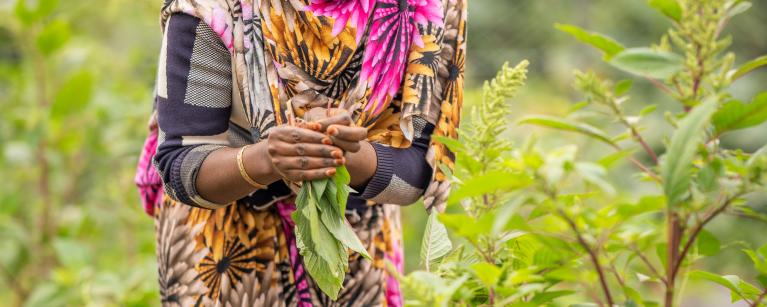Marsabit County, situated in the northern region of Kenya, has been grappling with severe climate challenges that have exacerbated food insecurity. With five consecutive seasons of below-average rainfall, many communities in the region have faced significant livelihood losses. This situation is particularly dire for women, who often bear the brunt of food shortages and economic instability. We meet 26 year old Bokayo Galgalo from Manyatta Konso. Bokayo is the spokesperson of her women’s group that was formed in 2018, a group that emerged from a common struggle and a shared vision.
"Many women were widows. Some were looking for a husband. Some were in need of money. Some were selling alcohol. None of them wanted a husband. So, we decided to form a group," Bokayo recounts.
This collective was borne out of necessity. The lack of stable relationships and financial independence left many women feeling hopeless.

Bokayo Galgalo with plates of food at her homestead in Manyatta Konso, Marsabit. Photo by Misheck Macharia.
"It is very difficult to find a husband. There are many people here who do not have a husband. If you do not have a husband, there is no hope," she explains.
The group's formation was a beacon of hope for these women, providing them with a sense of community and mutual support. The turning point for Bokayo and her group came when Oxfam through its partner organization Pastoralist Community Initiative and Development Assistance (PACIDA) intervened with targeted training programs.
"PACIDA organized a training. After the training, they gave us farming tools," Bokayo recalls.
The training sessions covered essential agricultural skills such as how to plow the land and plant seeds. The women received tools like jembes, pangas, and seeds, including beans, green grams, and vegetables. These resources were critical in enabling them to start farming their own fields.
They also linked us to financial institutions that can help us obtain credit to grow our business and invest in a longer-term projects that are resilient and greater economic returns.
“When they taught us, they told us that we can still do business with profit. Instead of keeping the money in an account, we started giving out loans. We put interest on the loan and we get profit.”
The agricultural training yielded remarkable results. "Here we planted seeds. When we were taught, we were told that the seeds are nutritious. Many of us now have pumpkins, cucumbers, and tomatoes," says Bokayo, highlighting the group's success in growing a variety of crops.
This not only improved their food security but also enhanced their nutrition, which is vital for the health of their families.
"We started to work in our fields. Before, we used to put our money in an account. We did not want to use that money," says Bokayo.
The training also included financial literacy, teaching the women how to manage and invest their money effectively.
The newfound agricultural skills and the ability to grow their own food marked a significant change in their lives. "Before, I didn't know how to plow the land, how to plant seeds, how to grow food. Now we know," Bokayo proudly states. The empowerment through knowledge and resources has transformed their outlook on life and their capacity to support themselves.

Bonaya Galgalo and a group member at a group's farm. Photo by Misheck Macharia
The impact of the project extends beyond just the immediate benefits of food security and financial stability. It has fostered a sense of solidarity and mutual assistance within the community. "Now, when we are in trouble, people know how to help us," Bokayo mentions, emphasizing the strengthened community bonds.
The story of Bokayo Galgalo and her group is a testament to the transformative power of targeted interventions in building resilience and empowering women. Through the support of Oxfam and NORAD, these women have not only gained agricultural and financial skills but also a renewed sense of hope and agency over their lives. Their journey reflects the broader goals of
